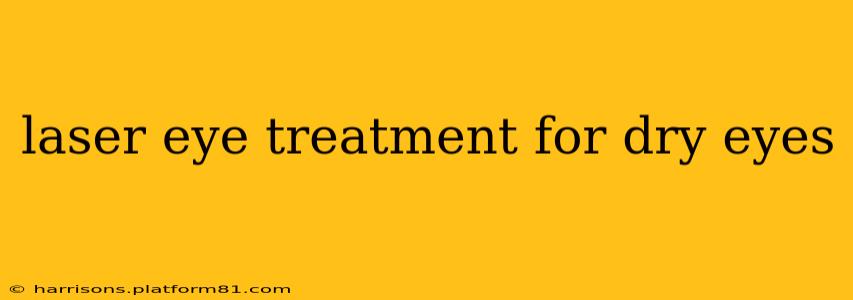Dry eyes are a common condition affecting millions, causing discomfort, irritation, and even impacting vision. While often treated with lubricating eye drops and lifestyle changes, some individuals explore laser eye treatments as a potential solution. This comprehensive guide delves into the relationship between laser eye surgery and dry eyes, exploring whether it can help, worsen the condition, or even be a contributing factor. We’ll also address common questions surrounding this topic.
Can Laser Eye Surgery Cause Dry Eyes?
Yes, laser eye surgery, particularly LASIK, can sometimes contribute to dry eyes, or worsen pre-existing dry eye symptoms. This is because the procedure affects the corneal nerves responsible for tear production and regulation. The laser reshapes the cornea, and in doing so, it can inadvertently damage these delicate nerves. This nerve damage can disrupt the natural tear film, leading to dryness, irritation, and a burning sensation. The severity varies greatly depending on the individual and the specific surgical technique used.
Does Laser Eye Surgery Help Dry Eyes?
No, laser eye surgery itself is not a treatment for dry eyes. In fact, as discussed above, it can often exacerbate the problem. While some individuals might experience a temporary improvement in dry eye symptoms after LASIK due to a reduction in refractive errors and a resultant decrease in eye strain, this is not a reliable outcome. If you suffer from dry eyes, it's crucial to address this condition before undergoing laser eye surgery. Failing to do so could lead to poorer surgical outcomes and potentially increased discomfort.
What are the Types of Laser Eye Surgery and How Do They Affect Dry Eyes?
Several types of laser eye surgery exist, each with varying potential impacts on dry eyes. LASIK (Laser-Assisted In Situ Keratomileusis) is the most common, and it carries a higher risk of inducing or worsening dry eye symptoms compared to other procedures. PRK (Photorefractive Keratectomy) is another technique, and while it may have a slightly lower risk of causing dry eye problems than LASIK, it still presents a potential. The precise effects depend on several factors, including the individual's pre-existing condition, the surgeon's skill, and post-operative care.
How is Dry Eye Treated After Laser Eye Surgery?
If dry eyes develop or worsen after laser eye surgery, your ophthalmologist will likely recommend various treatment options. These may include:
- Artificial tears: Frequent use of lubricating eye drops is the cornerstone of treatment.
- Punctal plugs: Small plugs inserted into the tear ducts to slow tear drainage.
- Restasis (cyclosporine): An eye drop that helps stimulate tear production.
- LipiFlow: A thermal pulsation device that helps treat meibomian gland dysfunction, a common cause of dry eyes.
- Omega-3 fatty acid supplements: These may help improve the quality of your tears.
Your doctor will tailor the treatment plan to your specific needs and the severity of your dry eye symptoms.
Can I Get Laser Eye Surgery if I Have Dry Eyes?
If you have dry eyes, it's essential to discuss your condition thoroughly with your ophthalmologist before considering laser eye surgery. They will assess the severity of your dry eyes and determine if your condition is stable enough for surgery. In some cases, treating your dry eyes first, perhaps with the methods listed above, might be necessary before proceeding with laser eye surgery. The goal is to minimize the risk of complications and ensure the best possible surgical outcome.
What Should I Ask My Doctor Before Laser Eye Surgery?
Before undergoing any laser eye surgery, you should ask your ophthalmologist these key questions:
- What are the potential risks and side effects associated with the procedure, particularly regarding dry eyes?
- How will my pre-existing dry eyes be managed before, during, and after surgery?
- What is your experience in performing this procedure on patients with dry eye conditions?
- What are the post-operative care instructions, specifically regarding managing dry eyes?
- What are the long-term implications of the surgery on my tear film and overall eye health?
By openly discussing your concerns and obtaining thorough information, you can make an informed decision about the suitability of laser eye surgery for your individual circumstances. Remember that open communication with your ophthalmologist is key to a successful outcome.
